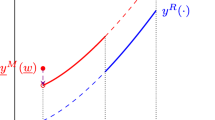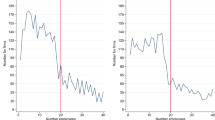Abstract
Long waits for goods, services, and jobs to become available still exist in and to the east of Europe. This paper explores the political economy of what has made pervasive rationing an attractive way to cope with shocks in the past. The explanation advanced lies not in the creation of shortage rents for the personal profit of corrupt insiders controlling the production and distribution process. Instead, rationing with queuing is viewed as a “populist” scheme that allows a majority to keep its wages above levels that would clear the labor market while hiding the cost of such a policy, increased unemployment.
Similar content being viewed by others
References
Alexeev, M. (1991). If market clearing prices are so good then why doesn't (almost) anybody want them?Journal of Comparative Economics 15: 380–390.
Allen, M. (1992). IMF-supported adjustment programs in Central and Eastern Europe. In G. Winckler (Ed.).Central and Eastern Europe roads to growth. Washington, D.C.: International Monetary Fund (henceforth IMF), 23–50.
Bénassy, J.-P. (1993). Nonclearing markets: microeconomic concepts and macroeconomic applications.Journal of Economic Literature 31: 732–761.
Bennett, J. (1994). Queuing and the price level under repressed inflation.Oxford Economic Papers 46: 68–82.
Borensztein, E., Demekas D.G. and Ostry J.D. (1993). An empirical analysis of the output decline in three Eastern European countries.IMF Staff Papers 40: 1–31.
Boycko, M. (1992). When higher incomes reduce welfare: queues, labor supply, and macro equilibrium in socialist economies.Quarterly Journal of Economics 107: 907–920.
Buchanan, J. (1990). Socialism is dead; Leviathan lives.Wall Street Journal (18 July): A8, col. 3.
Burda, M. (1993). Unemployment, labor markets and structural change in Eastern Europe.Economic Policy 16: 102–128.
Calvo, G. and Coricelli F. (1993). Output collapse in Eastern Europe.IMF Staff Papers 40: 32–52.
Clague, C. (1992). From socialism to market: changing the rules of the game. College Park, MD: The Center for Institutional Reform and the Informal Sector (IRIS),Working Paper 27.
Cooter, R.D. (1992). Organization as property. In C. Clague and G.C. Rausser (Eds.),The emergence of market economies in Eastern Europe. Cambridge, MA: Blackwell Publishers.
Darby, M. (1976). Price and wage controls: the first two years. In K. Brunner and A.H. Meltzer (Eds.),The economics of price and wage controls. Amsterdam: North-Holland.
Fender, J. and Laing, D. (1993). A macro model of queuing and resale in a transition economy.Comparative Economic Studies 35: 1–17.
Fernandez, R. and Rodrik, D. (1991). Resistance to reform: status quo bias in the presence of individual-specific uncertainty,American Economic Review 81: 1146–1155.
Kornai, J. (1992). The socialist system: the political economy of communism. Princeton: Princeton University Press.
Levy, D.M. (1990). The bias in centrally planned prices.Public Choice 6: 213–226.
— (1993). A public choice aspect of data provision.Accountability in Research 3: 157–163.
Marer, P. (1993). Economic transformation in Central and Eastern Europe. In S. Islam and M. Mandelbaum (Eds.),Making markets: economic transformation in Eastern Europe and the Post-Soviet states. New York: Council on Foreign Relations Press.
Osband, K. (1992). Economic crisis in a shortage economy.Journal of Political Economy 100: 673–690.
Owsiński, J.W. (1992). The herring barrel metaphor revisited. In J.W. Owsiński, Jacek Stefański and Andrzej Straszak (Eds.),Transition to advanced market economies: strategic options, modelling approaches and operational research perspectives. Warsaw: Assoc. of Polish Op. Res. Societies.
Polterovich, V. (1993). Rationing, queues, and black markets.Econometrica 61: 1–28.
Shleifer, A. and Vishny, R.W. (1992). Pervasive shortages under socialism.Rand Journal of Economics 23: 237–246.
— and Vishny, R.W. (1993). Corruption.Quarterly Journal of Economics 108: 599–617.
Author information
Authors and Affiliations
Additional information
The authors are indebted to Michael Alexeev and to an anonymous referee for helpful comments.
Rights and permissions
About this article
Cite this article
Von Furstenberg, G.M., Spangenberg, N.O. The political temptations of rationing by insiders. Public Choice 88, 69–81 (1996). https://doi.org/10.1007/BF00130410
Accepted:
Issue Date:
DOI: https://doi.org/10.1007/BF00130410




